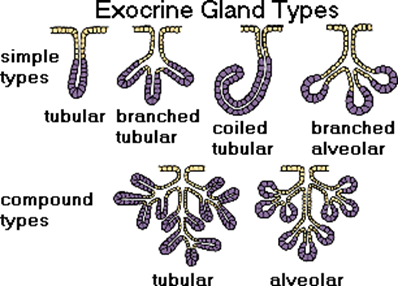Exocrine glands differ from endocrine glands in that exocrine glands:
Only secrete salts.
Secrete only local hormones.
Secrete only into the bloodstream.
Secrete through ducts or tubes to the body’s exterior.
The Correct Answer is D
Exocrine glands secrete through ducts or tubes to the body’s exterior.

For example, sweat glands, salivary glands, and liver are exocrine glands.
Choice A is wrong because exocrine glands do not only secrete salts, but also other substances such as enzymes, mucus, and sebum.
Choice B is wrong because exocrine glands do not secrete hormones at all.
Hormones are secreted by endocrine glands, which are ductless glands that release their products directly into the bloodstream.
Choice C is wrong because exocrine glands do not secrete into the bloodstream, but onto an epithelial surface such as the skin or the gastrointestinal tract.
Only endocrine glands secrete into the bloodstream.
Nursing Test Bank
Naxlex Comprehensive Predictor Exams
Related Questions
Correct Answer is B
Explanation
The hypothalamus is the part of the brain that produces hormones that control the pituitary gland.
The pituitary gland then releases hormones that target other endocrine glands, such as the thyroid, adrenal, and gonads.
Therefore, the hypothalamus is the source of releasing hormones for target cells in the anterior pituitary gland.
Choice A is wrong because the anterior pituitary gland does not produce releasing hormones, but responds to them by secreting other hormones.
Choice C is wrong because the thyroid gland does not produce releasing hormones, but responds to them by secreting thyroid hormones.
Choice D is wrong because the posterior pituitary gland does not produce releasing hormones, but stores and releases hormones made by the hypothalamus, such as oxytocin and antidiuretic hormone.
Correct Answer is B
Explanation

B cells are a type of lymphocyte that originate from the bone marrow and are involved in humoral immunity.
When they encounter a foreign substance (antigen), they differentiate into plasma cells, which secrete antibodies.
Antibodies are proteins that bind to the antigen and neutralize it.
Choice A is wrong because megakaryocytes are large cells that produce platelets, not antibodies.
Choice C is wrong because antibodies are not cells, but products of plasma cells.
Choice D is wrong because T cells are another type of lymphocyte that originate from the thymus and are involved in cell-mediated immunity, not antibody production.
Whether you are a student looking to ace your exams or a practicing nurse seeking to enhance your expertise , our nursing education contents will empower you with the confidence and competence to make a difference in the lives of patients and become a respected leader in the healthcare field.
Visit Naxlex, invest in your future and unlock endless possibilities with our unparalleled nursing education contents today
Report Wrong Answer on the Current Question
Do you disagree with the answer? If yes, what is your expected answer? Explain.
Kindly be descriptive with the issue you are facing.
